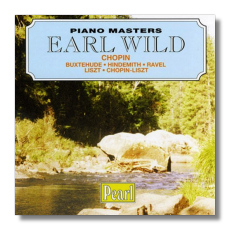
The Internet's Premier Classical Music Source
Related Links
- Latest Reviews
- More Reviews
-
By Composer
-
Collections
DVD & Blu-ray
Books
Concert Reviews
Articles/Interviews
Software
Audio
Search Amazon
Recommended Links
Site News
 CD Review
CD Review
Piano Masters

Earl Wild
- Dietrich Buxtehude: Suite in D minor
- Paul Hindemith: Piano Sonata #3
- Maurice Ravel: Pavane
- Franz Liszt: Étude in D Flat Major "Sospiro"
- Frédéric Chopin:
- Chant polonaise (arr. Liszt)
- Waltzes (3)
- Études (4)
- Prélude in D minor, Op. 28, #24
Earl Wild, piano
Pearl GEM0091 ADD monaural 61:39
Several pianists earned the unfortunate tag "the last romantic" until they too gasped their last. One thinks of Horowitz, Bolet, and Cherkassky. Earl Wild is still with us, and, last I knew, still performing in his mid 80s. Now he is being called the last Romantic, but he doesn't need the hype to convince listeners of his emotional generosity, as well as of his fabulous technique.
The material on this CD is very unusual. Half of the selections are taken from acetates of U.S. radio transcriptions from around 1948. The sound is excellent, although some of the sides are noisier than others. The balance of the material (most of the Chopin) was recorded for or by the Majestic Radio and Television Company, whatever that might be. Producer Roger Beardsley comments that the sides are "almost certainly dubbings from original acetates and poor ones at that." Were it not for the phenomenal quality of Wild's playing, it probably wouldn't have been worthwhile to clean them up. One needs to put more effort into listening to these sides, but I agree with Beardsley when he writes that sonic limitations can't get in the way of pianism such as Wild's.
The Buxtehude is played with a melting legato. When you hear how smooth it is, you'll be amazed at how sensuous his music can be. (In fact, two of the movements are titled "Allemande d'amour" and "Sarabande d'amour.") Even the usually cerebral Hindemith seems to have a swelling heart on this CD. Wild's strength, coupled with his agility and clarity, are put to the service of his emotional honesty. Another one of Wild's strengths, his control over tone color (assisted by his preference for Baldwin pianos), is shown by Ravel's Pavane for a Dead Princess, which is pearly and exquisite on this CD. Wild's reading is quite slow (7:01) and grave, but not sentimental. In Liszt's "Sospiro" Étude, Wild seems to sprout extra pairs of hands as the piece progresses.
The Buxtehude and Hindemith are thought to have been recording premières, so this CD has a secondary importance. Wild's bread and butter, though, have been Liszt and Chopin (and Schumann, and Beethoven, and… !) and so the extensive selection of brief Chopin Waltzes, Études, and the angry 24th Prélude demonstrates that Wild came to an understanding with this music at even a fairly young age. Interpretively, Wild didn't change his mind very much. It is wonderful to hear the youthful bravado of his playing, however. Recommended.
Copyright © 2000, Raymond Tuttle


















